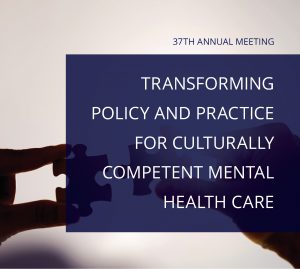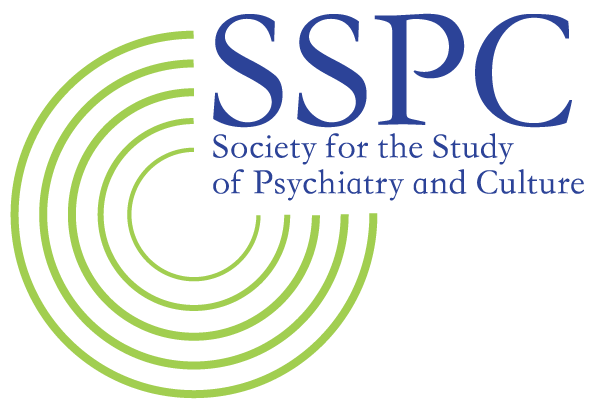Program
 Transforming Policy and Practice for Culturally Competent Mental Health Care*
Transforming Policy and Practice for Culturally Competent Mental Health Care*
*Registration fee includes continental breakfast and lunch (May 5–7) and one reception/light dinner.
Download flyerDownload full program
- Keynote sessions featuring Margarita Alegría, Professor of Psychology in Psychiatry at Harvard Medical School, and Octavio Martínez, Executive Director of the Hogg Foundation for Mental Health
- Symposia on a variety of topics, with a keynote symposium on the Affordable Care Act, focusing on challenges to service delivery for patients of diverse cultural backgrounds
- Workshops on patient care, teaching, and research
- See old friends and make new ones.
This Program Will Prepare Attendees To:
- Identify policy resources for improving cultural competence of clinical care, education, and research in mental health
- Analyze and appraise the cultural applicability of policies and practices to diverse populations
- Integrate cultural considerations in policies and practice guidelines relevant to their work in clinical care, education and research
- Develop education materials on cultural psychiatry for health care professionals
Day 1, Thursday, May 5, 2016
| Time | Title | Speaker/Facilitator |
| 8:30–9:00 | Welcome Remarks | |
| 9:00–10:00 | Opening Plenary:
Challenges and Opportunities of Coaching Providers in Shared Decision-Making and Improved Communication with their Multicultural Patients |
Margarita Alegría
Chair: Roberto Lewis-Fernández |
| 10:00–10:15 | Break | |
| 10:15–12:15 | ACA Plenary:
The Patient Protection and Affordable Care Act: Issues, Challenges, and Solutions for Cultural Psychiatry |
Donald Banik Sergio Aguilar-GaxiolaModerator/Discussant: Hendry Ton |
| 12:15–1:15 | Lunch | |
| 1:15–3:15 | Workshop 1:
Crouching Educator, Hidden Curriculum: The Art of Cultural Competence Education |
Kenneth Fung
Lisa Andermann |
| Workshop 2:
Cultural Family Therapy – The Theory and Practice of Cultural Psychiatry with Families (Family Track) |
Vincenzo Di Nicola
Steven J. Wolin |
|
| Paper Session 1: Education – Innovations, Part 1 (Moderator: James Griffith) | ||
| Development of a transformative leadership and health systems-strengthening training program: A pathway to engaging underserved populations | Gilberte Bastien | |
| The use of a mental health awareness tour to increase awareness of health disparities and mental health | Auralyd Padilla | |
| Espiritualidad y lenguaje: development of cultural competence with Latin@ populations through a service-learning course | Alyssa Ramírez Stege, Ivan Cabrera, Mary Dueñas, Stephen Quintana | |
| Structural competency: Experiences of early adopters of social determinants of health-focused clinical curricula | Sewit Bereket | |
| Using indigenous proverbs to improve cross-cultural communication and understanding of mental health concepts | Ahmed Hassan | |
| 3:15–3:30 | Break | |
| 3:30–5:30 | Workshop 3:
Making Culture Matter in Complex Care Delivery and Organizational Practice |
Madhuri Shors Dennis Maurer Roli Dwivedi Kate Erickson |
| Workshop 4:
Teaching the Management of Stigma Using Social Psychology and Social Neuroscience |
James Griffith Brandon Kohrt |
|
| Paper Session 2: Education – Innovations, Part 2 (Moderator: Kenneth Fung) | ||
| Training Muslim religious leaders to reduce stigma and improve access to mental health care | Ahmed Hassan
Pa Chia Vue |
|
| “Learning from success” as a cultural training tool | Matityahu Angel | |
| Local reflective practice: A simple, comprehensive framework for cultural training of health service psychologists | Kelly M. Moore | |
| Microaggressions: A perspective on building a cultural psychiatry curriculum | Anique Forrester | |
| Reflecting on the educational and training aspects of the cultural experience in the placement of first-year medical students in First Nation and Métis communities | Bobby Chaudhuri | |
| 6:00–8:00 | Reception at the Campus Club | |
Day 2, Friday, May 6, 2016
| Time | Title | Speaker/Facilitator |
| 8:30–10:30 | Workshop 5:
Training Clinicians in the DSM-5 Cultural Formulation Interview: An Evidence-Based Didactic and Experiential Workshop |
Neil Aggarwal
Ravi DeSilva Roberto Lewis-Fernández |
| Workshop 6:
Family and Culture: Clinical Tools for Everyday Practice |
Ellen Berman Alison Heru |
|
| Paper Session 3: Explanatory Models, Cultural Context, and Care (Moderator: Renato Alarcon) | ||
| Therapist-patient discrepancy in illness explanations and early outcome in intercultural psychotherapy | Samrad Ghane | |
| Depression treatment-seeking in the context of a drug epidemic: Same services, different stigmas | Claire Snell-Rood | |
| The mediating role of family conflict, parental monitoring, and deviant peer relationships on the association between intergenerational cultural dissonance and alcohol use among Asian American youth | Jeremy Kane | |
| 10:30–10:45 | Break | |
| 10:45–11:30 | Charles Hughes Memorial Fellowship Lecture (Part 1)
Rethinking the concept of “kokoro no kea” (care for mind) for victims of disaster in Japan |
Saikiko Yamaguchi |
| 11:30–12:30 | POSTER SESSION | |
| Ethnic and gender differences in domains of mental health recovery in a transcultural community mental health clinic | Poh Choo How | |
| Exploring older Hmong individuals’ expression and experience of depression: A qualitative study | Pachida Lo | |
| Advocating for advocacy: Assessing advocacy skills and student development in a counseling psychology doctoral program | Alyssa Ramírez-Stege, Dustin Brockberg, Elaina Meier | |
| Culture and mental health in a regional health district in Australia: Challenges and opportunities | Bipin Ravindran | |
| Attitudes and perceptions of suicide and suicide prevention messages for Asian Americans | Priyata Thapa | |
| The duration of untreated psychosis in an outpatient clinic in Mexico | Sylvanna Vargas | |
| An In-depth case study of urban space and parental agency in a public housing project in Baltimore City | J. Corey Williams | |
| Bad eye: North Siberian Turk culture-bound syndrome | Tsezar Korolenko
Tatiana Korolenko |
|
| Assessment of training needs in developing culturally competent mental health training models | Vishali Raval | |
| 12:30–1:15 | Lunch & Business Meeting | |
| 1:15–3:15 | Workshop 7:
Deportation of Mentally Ill Individuals Detained Under ICE Custody: Law Student Clinic and Psychiatry-Law Partnership |
Chair: Jerome Kroll
Linus Chan Chinmoy Gulrajani Nicholas Hittler |
| Symposium 1:
Transforming Counter-Terrorism Policy by Researching Religious Justifications of Violence: Three Cases of Islamist Terrorism |
Neil Aggarwal
John Horgan Ronald Schouten |
|
| Paper Session 4: Global Mental Health (Moderator: Brandon Kohrt) | ||
| Access to what? Contextualizing “diagnosis,” “recovery,” and “access to care” in Northern India | Sumeet Jain | |
| A qualitative study of community and health worker perceptions of task sharing: Lessons learned from Nepal | Anna Fiskin | |
| UVA-Guatemala initiative for mental health: Mental health care in post-conflict countries and implementing changes in poor resource settings | Souraya Torbey | |
| Political terrorism and prolonged abduction in Africa | Samuel Okpaku | |
| Community mental health in the Vanni: A community-based empowerment method for mass trauma and reconciliation | Kate Benham | |
| 3:15–3:30 | Break | |
| 3:30–5:30 | Workshop 8:
Mindfulness and Racial Bias: Interrupting Unconscious Patterns |
Terri Karis
Madhuri Shors |
| Symposium 2:
Politics of Concern |
Bruce Field Holly Dunn Nancy Luxon Discussant: Lisa Hilbink |
|
| Workshop 9:
Lessons from the Birth of the Women’s Movement: The film, “She’s Beautiful When She’s Angry” |
Francis Lu
Moderator: Shannon Suo |
|
| Workshop 10:
Resident Case Consultation |
Kenneth Fung | |
Day 3, Saturday, May 7, 2016
| Time | Title | Speaker/Facilitator |
| 8:30 – 10:30 | Workshop 11:
Cross-Cultural Instrument Adaptation Part 1: Adapting Existing Instruments |
Bonnie Kaiser Brandon Kohrt Andrew Rasmussen Nuwan Jayawickreme |
| Workshop 12:
Implementing Culturally Sensitive Integrated Care Models: From Theory to Practice |
Albert Yeung Trina Chang Nhi-Ha Trinh |
|
| Workshop 13:
The Amish and Mental Health Care: An Introduction to Cultural Factors, Current Treatment Models, and Future Directions |
Emily Troyer Mary Kay Smith Julian Davies |
|
| Paper Session 5: Refugee and Minority Populations (Moderator: James Boehnlein) | ||
| Responding to the border crisis: Reflections of a clinical trainee | Rosemary Fister | |
| Integration of a refugee mental health service into a family medicine clinic | Larry Merkel | |
| Characteristics of culturally responsive mental health care systems for refugees | Patricia Shannon | |
| Diasporic encounters with culture: Implications for policy and practice | Joan Simalchik | |
| Cure violence/heal trauma: A cognitive-behavioral approach to reducing community violence in minority communities | Matthew Domínguez | |
| 10:30 – 11:00 | Break | |
| 11:00 – 11:45 | Charles Hughes Memorial Fellowship Lecture (Part 2) Cholera, stigma, and the policy tangle in the Dominican Republic: An ethnography and policy analysis of Haitian migrant experiences | Hunter Keys |
| 11:45 – 1:00 | Lunch & Business Meeting | |
| 1:00 – 3:00 | Workshop 14:
Cross-Cultural Instrument Adaptation Part 2: Novel Tool Development |
Bonnie Kaiser Brandon Kohrt Jo Weaver |
| Workshop 15:
Providing Quality Health Care with CLAS: Curriculum for Developing Culturally and Linguistically Appropriate Services |
Hendry Ton
Sergio Aguilar-Gaxiola |
|
| Workshop 16:
A Sociocultural Approach to the Assessment and Management of Postpartum Depression Among Immigrant Women |
Pamela Montano Maria Jose Lisotto Matthew Domínguez |
|
This activity has been planned and implemented in accordance with the accreditation requirements and policies of the Accreditation Council for Continuing Medical Education (ACCME) through the joint providership of the Warren Alpert Medical School of Brown University and the Society for the Study of Psychiatry and Culture. The Warren Alpert Medical School of Brown University is accredited by the ACCME to provide continuing medical education for physicians.
Credit Designation
Physicians: The Warren Alpert Medical School of Brown University designates this live activity for a maximum of 19.5 AMA PRA Category 1 Credits™. Physicians should claim only the credit commensurate with the extent of their participation in the activity. (Day 1 – 6.75; Day 2 – 6.75; Day 3 – 6.0)
